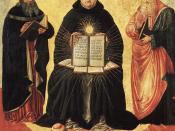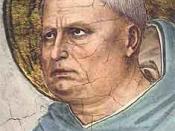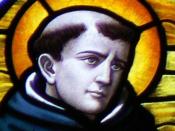A true interpretation of ethics and morality can only be obtained through the understanding of God and divine providence. Without a correct view of God's nature, man would be helpless to understand his role and position in the order of creation. This theory would presuppose the existence of a supreme being or higher authority. This acceptance of a higher authority then mandates the establishment of moral standards. These standards are the basis for all ethical theory, which is a universal standard, effective for all people, excluding none. Once these standards have been given, it is now left under the individual responsibility of the will to define those laws.
There are two primary schools of thought capable of defining moral standards in the context of divine authority. The first is a pantheistic view of ethics espoused by Epictetus, a stoic of the first century. To Epictetus, God was a rational principle immanent in the universe functioning as a vital force that creates and governs all things in the universe.*(44)
But the stoic continues his explanation of God describing him as a cosmic intelligence which interacts with the universe from within this reality. Humanity, in this rationale, is considered to be part of that cosmic intelligence drawling moral insights from the combined rational of every sentient being.
This ability to tap into the universal consciousness allows man to deduce a standard of morality that supports the basis for further exploration of the human experience, of which are three defining questions:
1. What is the nature of man?
2. How does one decide right and wrong?
3. What is the chief good?
However, the solution to these questions can only be entertained in the light of universal understanding, and in so doing they develop distinct truisms that pre-define how they may...


